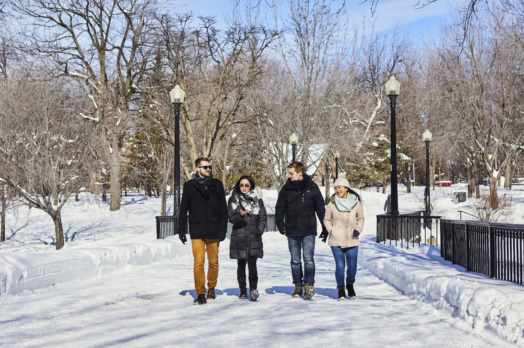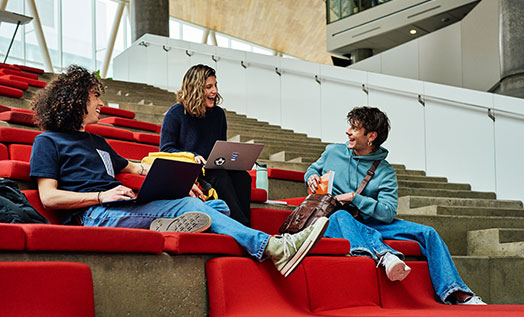From New York to Tokyo and Paris, first graders are taught that 1 + 1 always equals 2. This goes to say that, knowledge is universal; only the paths that lead to it are different. Québec has its own way of doing things and its own, unique education system. Keep reading to understand how it works and get to know the lingo!
The four levels of education in the Québec system
From the first day at kindergarten to the final thesis at university, Québec’s education system is divided into four distinct levels:
- Pre-school education (known as kindergarten in Canada)
- Primary and secondary education, including vocational training
- College education, consisting of pre-university and technical training
- University education
The unique DNA of Québec’s education system
Guided by the ministère de l’Éducation et de l’Enseignement supérieur, various public and private educational institutions offer training at every level.
The public system is secular in accordance with the state governance. And in both the public and private systems, classes are mostly mixed and offered in French and English, depending on the school. The Québec system also offers several bilingual and trilingual programs to promote inclusivity and accessibility to the broader job market.
The benefits of studying in Québec
Québec schools are extremely popular, attracting more than 50,000 students from around the world every year. Here are the top three reasons why they choose la belle province:
1. The quality of teaching and facilities
Québec schools are known for their substance as much as their style. Faculties and programs are internationally renowned for their excellence, offering leading-edge training in a diverse range of disciplines.
Most higher learning institutions in the province boast state-of-the-art science and computer labs, sports facilities and theatres.
2. The low cost of living
Since education is a top priority in Québec, schooling here is highly affordable. Tuition fees for international students are among the lowest in North America. Add to that the fact that Québec boasts one of the lowest costs of living on the continent and it’s easy to see why Montréal is a winning choice.
3. The exceptional conditions
Just like Québec society, schools in the province are safe, open and inclusive. With its diverse culture, countless activities, abundant neighbourhoods and vast green spaces, Québec is a unique and exceptional place to call home.
World-class vocational training



Who says learning should be limited to the classroom? Here in Québec, there’s no limit to the ways you can get an education. More than 50 centres in Greater Montréal offer vocational training, with various applications aimed at young people and adults looking to build their technical skills.
Vocational training courses are focused on applied learning and are aimed at acquiring a trade, allowing students to obtain of the following official diplomas:
- Diploma of Vocational Studies (DEP in Québec)
- Attestation of Vocational Specialization (AVS)
- Skills Training Certificate (STC)
If you’re a master of all things manual, Québec métiers d’avenir can help you find training programs that will put you in the heart of the action and prepare you for success in the workforce.
College training, for university or employment
In Québec, it’s not just our maple syrup that’s unique. We also have the cégep! This public institution, whose acronym stands for Collège d’enseignement général et professionnel (or General and Vocational College in English), is the first level of higher education in the province. There are more than 60 cégeps and private colleges in Greater Montréal, designed to give students access to either university or the job market.
1. Pre-university training
Pre-university training serves as a launching pad for students looking to go to university. These two-year cégep programs provide a Diploma of College Studies (DCS), which is mandatory in pursuing a higher education.
Note: Cégep is a must for Quebecers who want to go to university. International students can either study at a cégep before university or go directly to university, depending on the educational system in their home country and the admission requirements of their chosen university.
2. Technical training
Technical training is designed to prepare students for the job market. These three-year diplomas provide students with a Diploma of College Studies (DCS), which is mandatory if you’re looking to practice a trade in Québec.
Since there’s no age limit, technical training is aimed at adults of all ages. After studying for three years, students can go on to pursue an Attestation of College Studies (ACS) that will allow them to practice their profession.
In addition to the DCS and ACS, there are other college-level training programs available, including the Springboard to a DCS Pathway, remedial education, activities fostering student success, university prerequisites, customized training and services for business and industry.
To learn more about the college programs available to you, visit the ministère de l’Éducation et de l’Enseignement supérieur website.
Private colleges
In Québec, private colleges offer a range of programs adapted to students’ needs, however specialized they may be. You can find all the information you need on the Association des collèges privés du Québec website. This association is made up of a group of subsidized private colleges in Québec that offer pre-university and technical training.
Advance your education at university
As the name suggests, universities are universal! In Québec, like elsewhere, universities give students the opportunity to continue their education around the world while building valuable life experience. Greater Montréal is home to 11 higher learning institutions.
Made up of 1st, 2nd and 3rd cycles, university education in Québec is broken down as follows:
- Bachelor’s degree: 3 or 4 years, depending on the program
- Master’s degree: 1 or 2 years, depending on the program
- Doctorate or PhD: 3 or more years
… And the education process doesn’t have to end there. Students looking to pursue their education even further can enroll in postdoctoral programs as well. The majority of universities also offer short-term programs, like specialized graduate diplomas or certificates.
Well established sectors in Greater Montréal
Montréal has firmly established itself as a global leader in a range of key sectors, from artificial intelligence, aerospace and health technologies to video games, visual effects and cybersecurity. If you’re looking to work in one of these high-tech fields, check out the websites of institutions that interest you and find out more about the programs offered.


